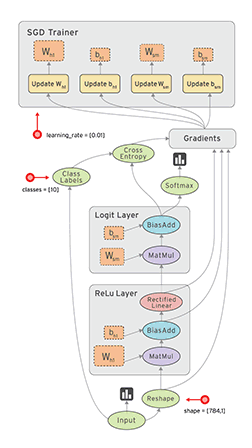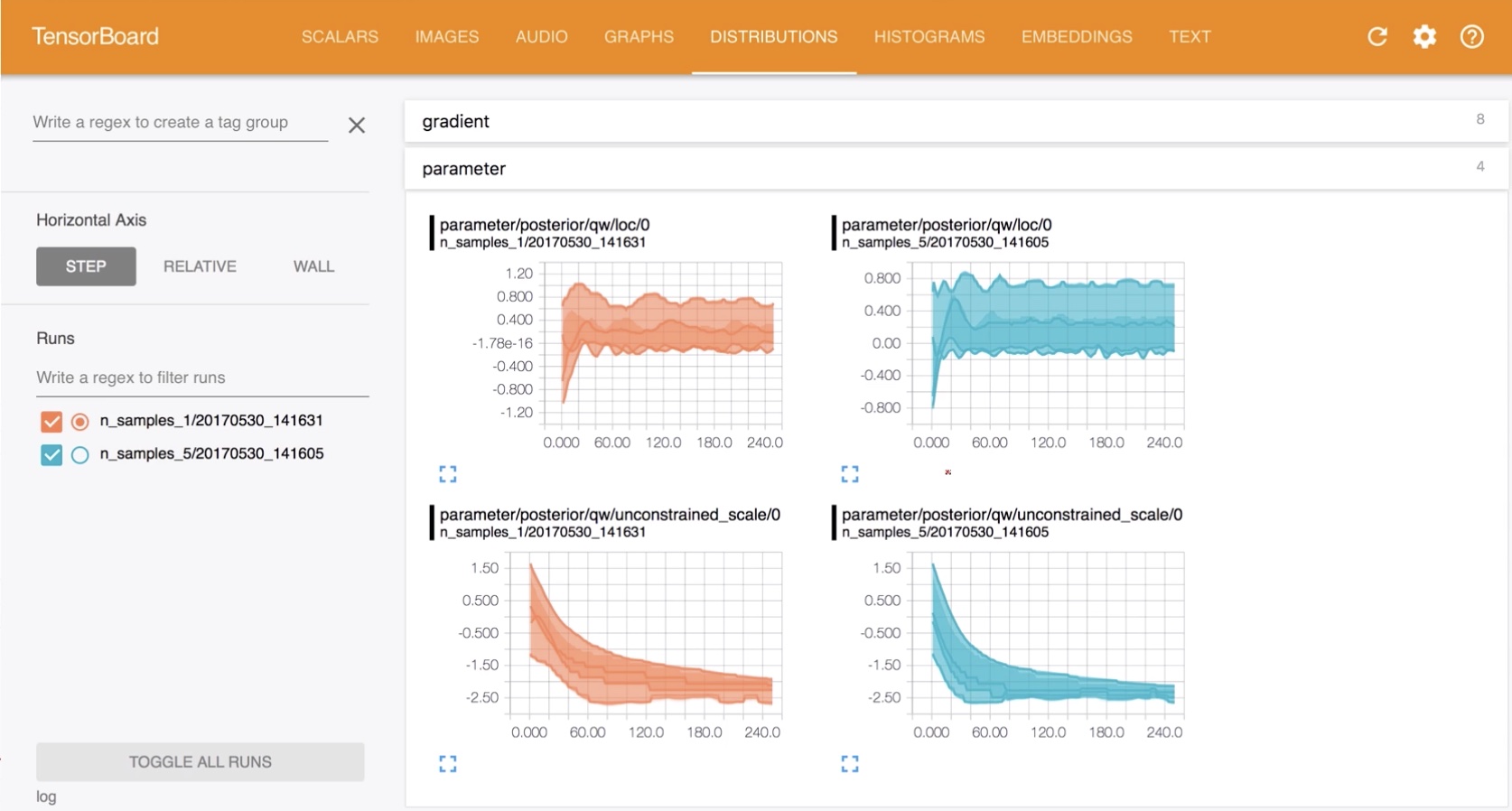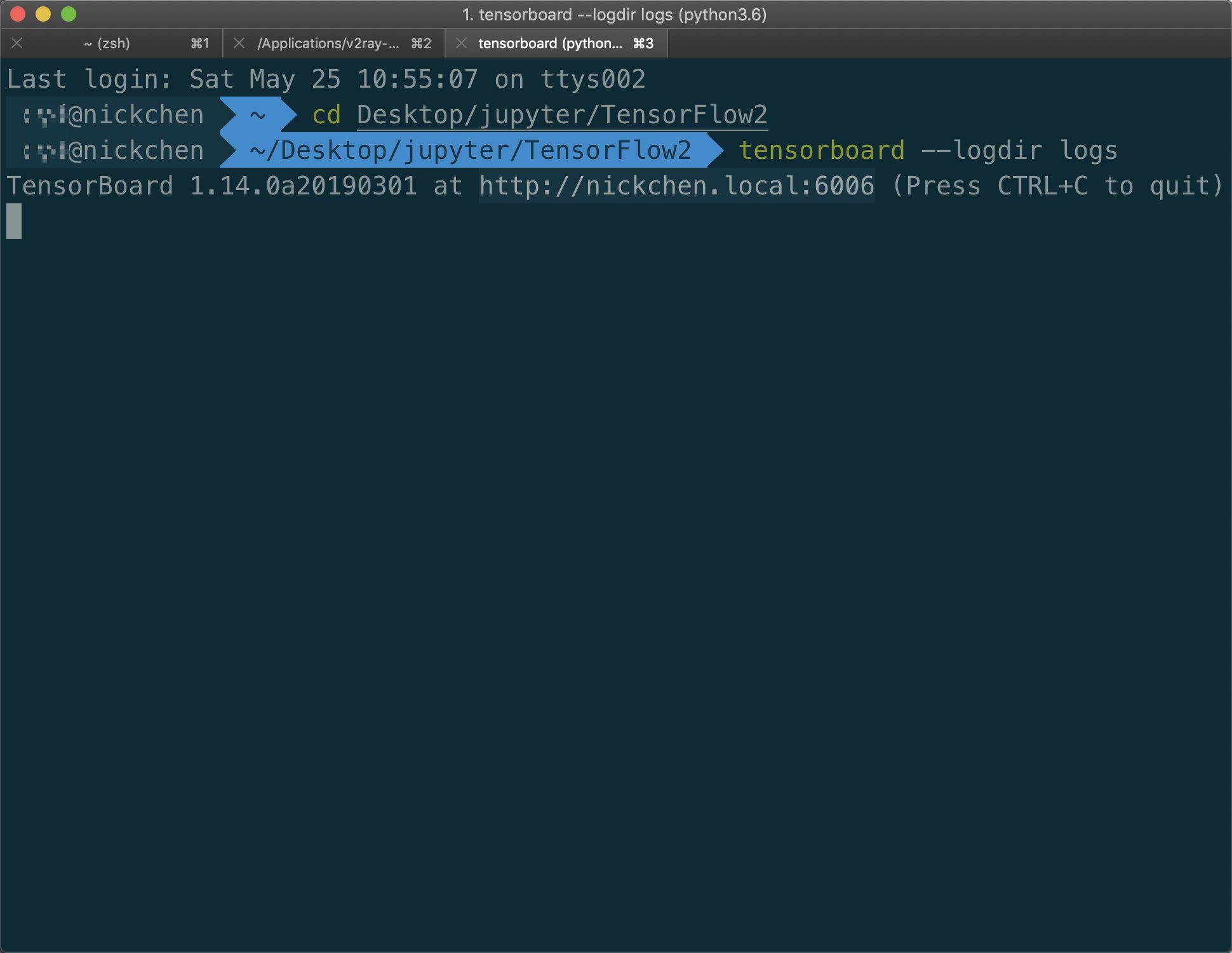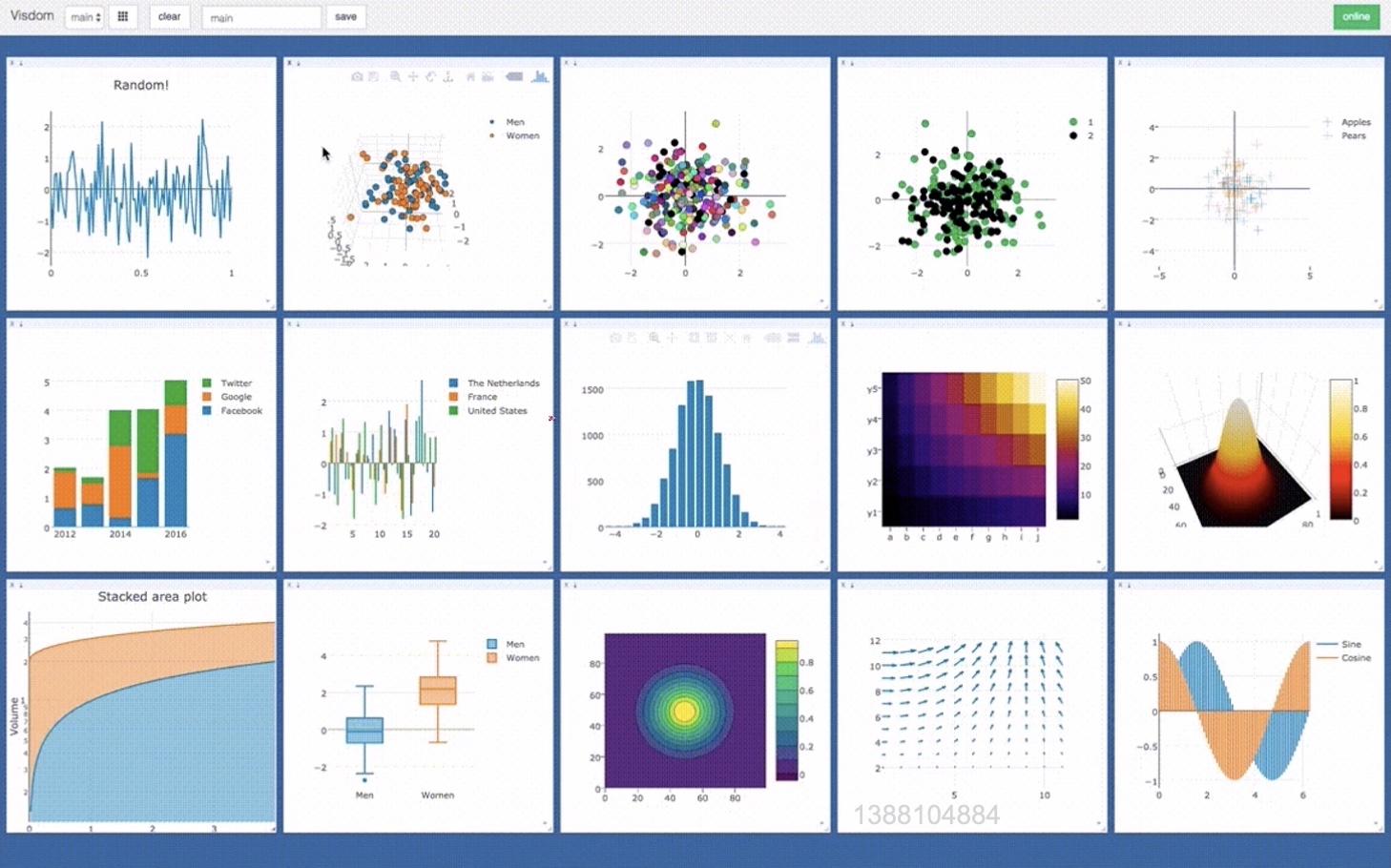目录
Tensor Flow

TensorBoard
-
Installation
-
Curves
-
Image Visualization

Installation
pip install tensorboard
Priciple
-
Listen logdir
-
build summary instance
-
fed data into summary instance
Step1.run listener

Step2.build summary
import datetime
import tensorflow as tf
current_time = datetime.datetime.now().strftime('%Y%m%d-%H%M%s')
log_dir = 'logs/' + current_time
summary_writer = tf.summary.create_file_writer(log_dir)
Step3.fed scalar
with summary_writer.as_default():
tf.summary.scalar('loss', float(loss), step=epoch)
tf.summary.scalar('accuracy', float(train_accuracy), step=epoch)
Step3.fed single Image
sample_img = next(iter(db))[0]
sample_img = sample_img[0]
sample_img = tf.reshape(sample_img, [1, 28, 28, 1])
with summary_writer.as_default():
tf.summary.image('Traning sample:', sample_img, step=0)
Step3.fed multi-images
val_images = x[:25]
val_images = tf.reshape(val_images, [-1, 28, 28, 1])
with summary_writer.as_default():
tf.summary.scalar('test-acc', float(loss), step=step)
tf.summary.image('val-onebyone-images:',
val_images,
max_output=25,
step=step)
Instance
import tensorflow as tf
from tensorflow.keras import datasets, layers, optimizers, Sequential, metrics
import datetime
from matplotlib import pyplot as plt
import io
def preprocess(x, y):
x = tf.cast(x, dtype=tf.float32) / 255.
y = tf.cast(y, dtype=tf.int32)
return x, y
def plot_to_image(figure):
"""Converts the matplotlib plot specified by 'figure' to a PNG image and
returns it. The supplied figure is closed and inaccessible after this call."""
# Save the plot to a PNG in memory.
buf = io.BytesIO()
plt.savefig(buf, format='png')
# Closing the figure prevents it from being displayed directly inside
# the notebook.
plt.close(figure)
buf.seek(0)
# Convert PNG buffer to TF image
image = tf.image.decode_png(buf.getvalue(), channels=4)
# Add the batch dimension
image = tf.expand_dims(image, 0)
return image
def image_grid(images):
"""Return a 5x5 grid of the MNIST images as a matplotlib figure."""
# Create a figure to contain the plot.
figure = plt.figure(figsize=(10, 10))
for i in range(25):
# Start next subplot.
plt.subplot(5, 5, i + 1, title='name')
plt.xticks([])
plt.yticks([])
plt.grid(False)
plt.imshow(images[i], cmap=plt.cm.binary)
return figure
batchsz = 128
(x, y), (x_val, y_val) = datasets.mnist.load_data()
print('datasets:', x.shape, y.shape, x.min(), x.max())
db = tf.data.Dataset.from_tensor_slices((x, y))
db = db.map(preprocess).shuffle(60000).batch(batchsz).repeat(10)
ds_val = tf.data.Dataset.from_tensor_slices((x_val, y_val))
ds_val = ds_val.map(preprocess).batch(batchsz, drop_remainder=True)
network = Sequential([
layers.Dense(256, activation='relu'),
layers.Dense(128, activation='relu'),
layers.Dense(64, activation='relu'),
layers.Dense(32, activation='relu'),
layers.Dense(10)
])
network.build(input_shape=(None, 28 * 28))
network.summary()
optimizer = optimizers.Adam(lr=0.01)
current_time = datetime.datetime.now().strftime("%Y%m%d-%H%M%S")
log_dir = 'logs/' + current_time
summary_writer = tf.summary.create_file_writer(log_dir)
# get x from (x,y)
sample_img = next(iter(db))[0]
# get first image instance
sample_img = sample_img[0]
sample_img = tf.reshape(sample_img, [1, 28, 28, 1])
with summary_writer.as_default():
tf.summary.image("Training sample:", sample_img, step=0)
for step, (x, y) in enumerate(db):
with tf.GradientTape() as tape:
# [b, 28, 28] => [b, 784]
x = tf.reshape(x, (-1, 28 * 28))
# [b, 784] => [b, 10]
out = network(x)
# [b] => [b, 10]
y_onehot = tf.one_hot(y, depth=10)
# [b]
loss = tf.reduce_mean(
tf.losses.categorical_crossentropy(y_onehot, out,
from_logits=True))
grads = tape.gradient(loss, network.trainable_variables)
optimizer.apply_gradients(zip(grads, network.trainable_variables))
if step % 100 == 0:
print(step, 'loss:', float(loss))
with summary_writer.as_default():
tf.summary.scalar('train-loss', float(loss), step=step)
# evaluate
if step % 500 == 0:
total, total_correct = 0., 0
for _, (x, y) in enumerate(ds_val):
# [b, 28, 28] => [b, 784]
x = tf.reshape(x, (-1, 28 * 28))
# [b, 784] => [b, 10]
out = network(x)
# [b, 10] => [b]
pred = tf.argmax(out, axis=1)
pred = tf.cast(pred, dtype=tf.int32)
# bool type
correct = tf.equal(pred, y)
# bool tensor => int tensor => numpy
total_correct += tf.reduce_sum(tf.cast(correct,
dtype=tf.int32)).numpy()
total += x.shape[0]
print(step, 'Evaluate Acc:', total_correct / total)
# print(x.shape)
val_images = x[:25]
val_images = tf.reshape(val_images, [-1, 28, 28, 1])
with summary_writer.as_default():
tf.summary.scalar('test-acc',
float(total_correct / total),
step=step)
tf.summary.image("val-onebyone-images:",
val_images,
max_outputs=25,
step=step)
val_images = tf.reshape(val_images, [-1, 28, 28])
figure = image_grid(val_images)
tf.summary.image('val-images:', plot_to_image(figure), step=step)
datasets: (60000, 28, 28) (60000,) 0 255
Model: "sequential_1"
_________________________________________________________________
Layer (type) Output Shape Param #
=================================================================
dense_5 (Dense) multiple 200960
_________________________________________________________________
dense_6 (Dense) multiple 32896
_________________________________________________________________
dense_7 (Dense) multiple 8256
_________________________________________________________________
dense_8 (Dense) multiple 2080
_________________________________________________________________
dense_9 (Dense) multiple 330
=================================================================
Total params: 244,522
Trainable params: 244,522
Non-trainable params: 0
_________________________________________________________________
0 loss: 2.3376832008361816
0 Evaluate Acc: 0.18008814102564102
100 loss: 0.48326703906059265
200 loss: 0.25227126479148865
300 loss: 0.1876775473356247
400 loss: 0.1666598916053772
500 loss: 0.1336817890405655
500 Evaluate Acc: 0.9542267628205128
600 loss: 0.12189087271690369
700 loss: 0.1326061487197876
800 loss: 0.19785025715827942
900 loss: 0.06632998585700989
1000 loss: 0.059026435017585754
1000 Evaluate Acc: 0.96875
1100 loss: 0.1200297400355339
1200 loss: 0.20464201271533966
1300 loss: 0.07950295507907867
1400 loss: 0.13028256595134735
1500 loss: 0.0644262284040451
1500 Evaluate Acc: 0.9657451923076923
1600 loss: 0.06169471889734268
1700 loss: 0.04833034425973892
1800 loss: 0.14102090895175934
1900 loss: 0.00526371318846941
2000 loss: 0.03505736589431763
2000 Evaluate Acc: 0.9735576923076923
2100 loss: 0.08948884159326553
2200 loss: 0.035213079303503036
2300 loss: 0.15530908107757568
2400 loss: 0.13484254479408264
2500 loss: 0.17365671694278717
2500 Evaluate Acc: 0.9727564102564102
2600 loss: 0.17384998500347137
2700 loss: 0.06045734882354736
2800 loss: 0.13712377846240997
2900 loss: 0.08388100564479828
3000 loss: 0.05825091525912285
3000 Evaluate Acc: 0.9657451923076923
3100 loss: 0.08653448522090912
3200 loss: 0.06315462291240692
3300 loss: 0.05536603182554245
3400 loss: 0.2064306139945984
3500 loss: 0.043574199080467224
3500 Evaluate Acc: 0.96875
3600 loss: 0.0456567145884037
3700 loss: 0.08570165187120438
3800 loss: 0.021522987633943558
3900 loss: 0.05123775079846382
4000 loss: 0.14489373564720154
4000 Evaluate Acc: 0.9722556089743589
4100 loss: 0.08733823150396347
4200 loss: 0.04572174698114395
4300 loss: 0.06757005304098129
4400 loss: 0.018376709893345833
4500 loss: 0.024091437458992004
4500 Evaluate Acc: 0.9701522435897436
4600 loss: 0.10814780741930008
Visdom
